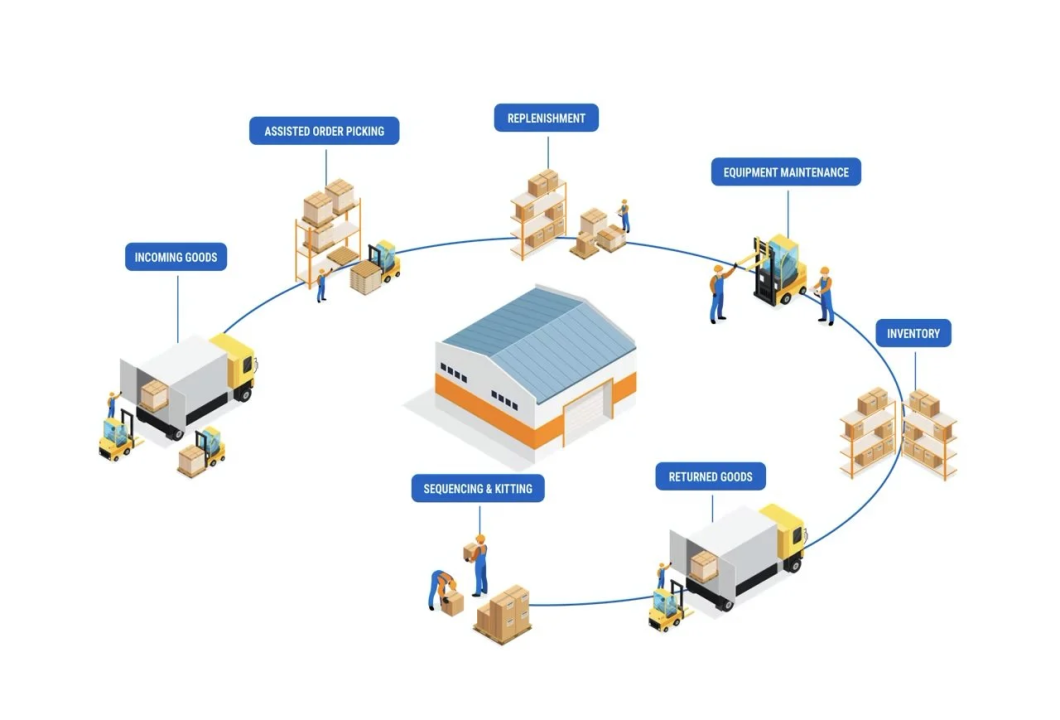
The Future of Warehouse Management:
Warehouse management has become a cornerstone of supply chain efficiency, and the rapid evolution of technology is reshaping the landscape. As businesses adapt to growing consumer demands and global commerce dynamics, staying ahead of trends is crucial. For regions like Dubai, known for its logistics excellence, embracing innovations in warehouse management is a competitive imperative. This article delves into the trends and innovations shaping the future of warehouse management, with a spotlight on “Warehouse Management in Dubai.”
1. Automation and Robotics
Automation is no longer a futuristic concept but a reality transforming warehouses worldwide. Robots are now handling tasks such as picking, packing, and transporting goods, significantly reducing labor costs and errors. Automated Guided Vehicles (AGVs) and Autonomous Mobile Robots (AMRs) are becoming staples in modern warehouses, ensuring faster and more efficient operations.
In Dubai, where efficiency and precision are paramount, integrating robotics is particularly impactful. Warehouses equipped with robotics not only streamline processes but also ensure scalability for businesses managing high volumes of goods.
2. Artificial Intelligence and Machine Learning
AI and machine learning are revolutionizing decision-making in warehouse management. Predictive analytics powered by AI enables warehouse managers to forecast demand accurately, optimize inventory levels, and identify potential bottlenecks before they occur.
For instance, businesses leveraging AI-driven tools in Dubai can make real-time adjustments based on market fluctuations, ensuring they meet customer expectations without overstocking or understocking.
3. Internet of Things (IoT) Integration
IoT devices are enhancing visibility and control across warehouse operations. Sensors monitor equipment performance, track inventory, and even ensure optimal storage conditions for perishable goods. With IoT, warehouse managers can access real-time data on operations, enabling quicker and more informed decisions.
Dubai’s reputation as a global logistics hub makes IoT integration vital. By utilizing smart sensors, warehouses in the region can maintain the high standards expected by international partners.
4. Sustainable Practices
Sustainability is a growing priority in warehouse management. Companies are adopting eco-friendly practices, such as using renewable energy sources, optimizing energy consumption, and implementing green packaging solutions.
In Dubai, where sustainability aligns with the government’s vision, warehouses are increasingly adopting practices like solar-powered facilities and energy-efficient systems. These initiatives not only reduce environmental impact but also appeal to eco-conscious clients.
5. Advanced Warehouse Management Systems (WMS)
Modern WMS software has become indispensable for optimizing warehouse operations. These systems integrate seamlessly with other business tools like ERP and CRM software, providing end-to-end visibility.
In Dubai, advanced WMS solutions allow businesses to manage complex supply chains efficiently. Features like real-time tracking, automated replenishment, and customizable reporting empower managers to maintain high levels of productivity.
6. Blockchain for Transparency and Security
Blockchain technology is emerging as a game-changer in supply chain and warehouse management. It ensures transparency by providing an immutable record of transactions, which is crucial for tracking goods and verifying their origins.
Warehouses in Dubai can benefit from blockchain by enhancing trust among stakeholders, particularly in industries like luxury goods and pharmaceuticals, where authenticity is critical.
7. Augmented Reality (AR) for Training and Operations
AR is redefining employee training and warehouse operations. AR devices provide workers with real-time guidance, such as navigation to locate products or instructions for equipment handling, thereby reducing errors and boosting efficiency.
For warehouses in Dubai, AR adoption can address the challenges of training a diverse workforce, ensuring consistent performance across teams.
Conclusion
The future of warehouse management is being shaped by cutting-edge technologies and sustainable practices. From automation and AI to IoT and blockchain, these innovations are driving efficiency, transparency, and adaptability.
For “Warehouse Management in Dubai,” the integration of these trends is not just an opportunity but a necessity. As a global leader in logistics, Dubai’s warehouses are setting benchmarks for innovation and excellence. By staying ahead of these trends, businesses in Dubai can continue to thrive in an increasingly competitive market.









